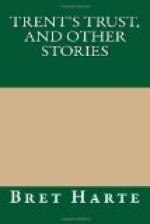Then followed a few days of uncertainty, when his thoughts again reverted to the preacher with returning jealousy. Was she, after all, like other women, and had her gratuitous outburst of scorn of their infatuation been prompted by unsuccessful rivalry? He was too proud to question Slocum again or breathe a word of his fears. Yet he was not strong enough to keep from again seeking the High Ridge, to discover any repetition of that rendezvous. But he saw her neither there, nor elsewhere, during his daily rounds. And one night his feverish anxiety getting the better of him, he entered the great “Gospel Tent” of the revival preacher.
It chanced to be an extraordinary meeting, and the usual enthusiastic audience was reinforced by some sight-seers from the neighboring county town—the district judge and officials from the court in session, among them Colonel Starbottle. The impassioned revivalist—his eyes ablaze with fever, his lank hair wet with perspiration, hanging beside his heavy but weak jaws—was concluding a fervent exhortation to his auditors to confess their sins, “accept conviction,” and regenerate then and there, without delay. They must put off “the old Adam,” and put on the flesh of righteousness at once! They were to let no false shame or worldly pride keep them from avowing their guilty past before their brethren. Sobs and groans followed the preacher’s appeals; his own agitation and convulsive efforts seemed to spread in surging waves through the congregation, until a dozen men and women arose, staggering like drunkards blindly, or led or dragged forward by sobbing sympathizers towards the mourners’ bench. And prominent among them, but stepping jauntily and airily forward, was the redoubtable and worldly Colonel Starbottle!
At this proof of the orator’s power the crowd shouted—but stopped suddenly, as the colonel halted before the preacher, and ascended the rostrum beside him. Then taking a slight pose with his gold-headed cane in one hand and the other thrust in the breast of his buttoned coat, he said in his blandest, forensic voice:—
“If I mistake not, sir, you are advising these ladies and gentlemen to a free and public confession of their sins and a—er—denunciation of their past life—previous to their conversion. If I am mistaken I—er—ask your pardon, and theirs and—er—hold myself responsible—er—personally responsible!”
The preacher glanced uneasily at the colonel, but replied, still in the hysterical intonation of his exordium:—
“Yes! a complete searching of hearts—a casting out of the seven Devils of Pride, Vain Glory”—
“Thank you—that is sufficient,” said the colonel blandly. “But might I—er—be permitted to suggest that you—er—er—set them the example! The statement of the circumstances attending your own past life and conversion would be singularly interesting and exemplary.”




